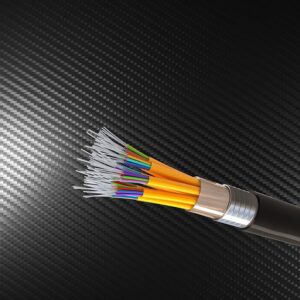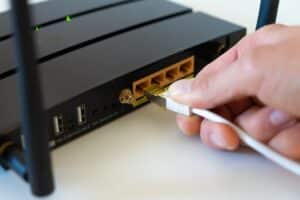Getting frustrated with variable internet speeds and interruptions in the case of broadband is common. It not only disturbs the running functions of the businesses but hampers communication with clients and customers as well.
Can’t there be a communication line that’s specifically dedicated to the business? Yes, enter dedicated lines.
What is a dedicated line?

A dedicated line, as evident from the name, is a con-contested telecommunication line that is solely devoted to a single business user. It’s always a fixed-bandwidth line but you can upgrade it to a higher speed provided it has the space. A dedicated line is either owned by the business or rented from an internet service provider (ISP) in which case it is referred to as leased line.
Now, what are dedicated lines used for? Well, their primary usage is to provide an unshared internet connection to a business that relies heavily on internet-related operations like digital marketing, e-commerce, online education, gaming and cloud computing. But its secondary uses also involve connecting IP devices like VoIP, sensors and CCTV cameras.
With speeds ranging from 1 MB to 10 GB, these lines provide your business various benefits such as better speed, more security, higher team productivity and low latency. Let’s look at the benefits in more detail.
Compare Leased Line Quotes Today
Types of dedicated lines
There are 2 main types of dedicated or leased lines.
1. Fibre leased lines:
These lines use optical fibre to provide high-speed internet connection. They offer symmetrical speeds, meaning upload and download speeds are identical and are beneficial in terms of high bandwidth capabilities, low latency and remarkable reliability.
They are used by data-intensive businesses that can afford high costs like financial institutions. For example, a bank might use a fibre leased line to connect its headquarters with its data centres and branch offices to ensure fast and secure transactions.
2. Wirelses leased lines:
Wireless leased lines use radio signals to provide dedicated internet connections without the need for physical cables. They offer flexible deployment, especially in areas where laying fibre is too costly or impractical. Their provided speed is not as high as the fibre lines and they can also be prone to environmental factors like rain and storms.
Wireless leased lines are usually used in remote or rural areas. For example, a construction company working on a remote site might use it to maintain reliable internet access for their onsite offices and remain in contact with suppliers, contractors and the main office.
Benefits of dedicated lines
In the modern world of business, high-speed internet has become undebatable. This is why many businesses are transitioning from Wi-fi and public internet connections to dedicated lines. Let’s look at the benefits of dedicated internet lines for businesses.
1. High speeds
This is unarguably the biggest advantage of dedicated lines. There are 2 reasons why they deliver lightening speeds:
- Optic fibre is used in the manufacture. Since it uses light signals instead of electrical signals, it incurs less signal loss and carries a higher amount of data as compared to copper lines.
- Dedicated lines are not shared among users, reserving the entire bandwidth for you and your business.
According to Airband, the average broadband internet speed in the UK was 42Mbps in 2022. Dedicated internet lines, on the other hand, can give you a bandwidth of 10Gbps (Although 100Mbps and 1GBps are more common).
2. Better security
One of the major concerns of businesses is the security of their sensitive data and critical resources. Although the security protocols of advanced cloud-hosting data centres are commendable, there is always a risk of data breaches involved due to shared connectivity.
With dedicated lines, you get better security since the connection is private and this limits the degree of opportunities for hackers. A secure network builds customer trust and increases the likelihood of a business thriving without being disrupted by cyber attacks.
3. More reliability
Dedicated lines offer a higher level of reliability compared to standard internet connections due to their private and uncontented nature. This ensures that the performance remains consistent even during peak usage times.
Another factor is the use of optic cables in dedicated lines. They are resilient to interference and damage and thus reduce outage risks considerably.
Moreover, service level agreements (SLAs) guarantee uptime and rapid issue resolution which provides businesses with minimal downtime. Most reliable providers promise a response time of 2 hours and a fix time of 5-6 hours. In the case of broadband users, you might have to wait for days for a major issue to get resolved.
4. Equal uploading speed
The symmetrical nature of the dedicated internet lines enables them to allow equal upload and download speeds. Majority of the broadband connections prioritise downloading. While this may work perfectly for a home internet (as the majority of your tasks involve downloading files), it will create issues for business operations.
Many cloud-based platforms like ERP and CRM will need regular uploading to the cloud and if your internet doesn’t allow a steady stream for that, it creates problems. Dedicated lines are symmetrical therefore they incur no such issue.
How much does a dedicated line cost?

The monthly cost of a dedicated fibre leased line will be anywhere between £300 to £850 per month. A wireless dedicated line will be even more expensive. This difference in cost depends on factors like the location of your business, the bandwidth you choose and the type of cable you select (FTTP or EoFTTC, e.g.).
For example, a 100Mb line will cost £200 in London and £270 in Ambleside.
Similarly, a 500 Mbps line will cost £300 while a 1 Gbps line will cost £450.
The installation costs are even higher than the monthly costs. You can expect to pay anything between £5000 to £40,000 for the installation depending on the location and the degree of digging needed.
The best way to find out how much a dedicated line will cost you is to contact the service providers in your area and get a complete quote for a dedicated leased line.
Uses of a dedicated line for businesses
No business wants a jittery, slow and uninterrupted internet connection. This is why many business owners with data-hungry businesses are moving towards dedicated lines. Some of the major uses for such businesses are mentioned below.
- Data centre connectivity for financial institutions: The bank can employ dedicated lines to connect its regional offices for the transfer of sensitive data, collaborating on financial documents and holding massive virtual meetings.
- Cloud services for tech companies: These companies might use leased lines to connect to cloud services like AWS and Azure for high-performance computing and storage needs. This includes uploading large amounts of data, storing gigantic datasets and training machine learning models in real-time.
- Media and broadcasting: The stakeholders of the TV network can use these lines to transfer high-definition video content between studios and production facilities. This high-speed internet connection ensures live broadcasts and content delivery occur without delays.
Dedicated line vs broadband: The difference
Dedicated lines and broadband are two different types of internet connectivity options. The most common differences between them are mentioned below.
- Dedicated lines are reserved solely for one user while the broadband is typically shared among multiple users.
- Dedicated lines offer fixed and guaranteed bandwidth with symmetrical speeds. The speeds can be up to 10 Gbps even. Broadband, on the other hand, provides variable bandwidth with potential asymmetry in speeds. E.g. a 100Mbps broadband internet connection might give a download speed of 90 Mbps at 1 AM but 50 Mbps at 7 PM.
- Dedicated lines are more expensive due to their uncontented nature, premium service and guarantee. Broadband is more affordable and offers a range of pricing options based on your usage and speed.
- Dedicated lines are always more reliable than broadband. They have minimal downtime and the provider ensures fast fix times. The broadband experiences variability in speed and reliability due to shared usage. And fixes may take a lot of time.
Explore Reliable Leased Line Providers In The UK With ComparedBusiness
ComparedBusiness helps you link with the top leased line providers in the UK. Just submit your requirements in less than 2 minutes and we will match you with the top service providers in the UK. You can pick and choose the best option as per your business requirements.
A leased line is a private, high-speed connection between locations, often used for internet and data transfer, with guaranteed symmetrical bandwidth. A dedicated line is a broader term for any reserved communication line providing exclusive connectivity for several applications, including leased lines.
Yes, dedicated internet is worth it for businesses needing reliable, high-speed connectivity. Unlike broadband, which shares bandwidth among users, dedicated internet offers guaranteed bandwidth and SLAs. For example, a financial firm using dedicated internet ensures uninterrupted, secure transactions and real-time data access, which enhances productivity and client trust.
The two types of dedicated lines are fibre leased lines, which use fibre-optic cables for high-speed, reliable data transmission, and wireless leased lines, employing radio or microwave technology for flexible, point-to-point connections.
